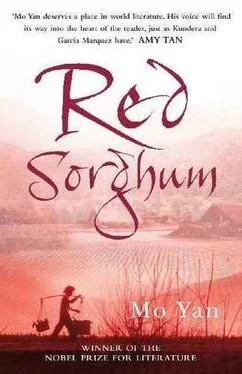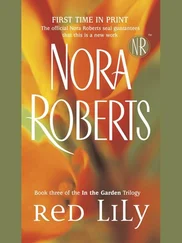Years later, Mother told my wife that her first menstrual period had come while she was down in that dark, dank well, and when my wife told me, the two of us felt enormous compassion for the fifteen-year-old girl who would later give birth to me.
Mother had no choice but to pin her final scrap of hope on that puddle of filthy water in which the toad was soaking, no matter how much its hideous features frightened or disgusted her. Nothing had changed from the day before: the toad hadn’t moved, its sombre eyes still glaring at her with hostility, its warty skin still making her skin crawl. Her new-found courage quickly evaporated. Poison darts emanating from the toad’s eyes prickled her all over. She averted her eyes, but that didn’t blot out the terrifying image of the toad.
Mother turned to look at her dying brother, and as she did so, her eye caught a tiny clump of milky-white mushrooms growing beneath two bricks. Her heart racing with excitement, she slid the bricks away and picked some of the mushrooms. Her innards twisted into knots as she gazed at the food in her hand. She shoved a mushroom into her mouth and swallowed it whole. It tasted so good that her hunger pangs returned in a flash. She put another in her mouth. Little Uncle moaned softly, but Mother consoled herself with the thought that she should try them first, in case they were toadstools. That’s right, isn’t it? Of course it is. She put one into Little Uncle’s mouth, but his jaws didn’t move; he just looked at her through tiny slits. ‘Harmony, eat it. I found it for you. Eat it.’ She held up another and waved it under his nose. His jaws twitched, as though he were chewing, so she fed him another one. But he coughed and spat them both out. By then his lips were so chapped they bled. He lay on the brick floor, close to death.
Mother swallowed a dozen or so little mushrooms, and her intestines, which had gone into hibernation, suddenly came to life, writhing painfully and making a huge racket. She was sweating more than she had at any time since being lowered into the well; it would be the last time. Sweat drenched her clothes; her armpits and the backs of her knees were wet and sticky. The chilled air seemed to penetrate the marrow of her bones, and she slumped unaware to the floor and lay beside her baby brother. At noon on her second day in the well, Mother fell into a swoon.
When she woke up, dusk was falling. She saw reddish-purple rays of light on the eastern wall as the sun sank in the west. The ancient windlass was bathed in the sunset, giving her the contradictory sensations of seeing remote antiquity and the approach of doomsday at the same time. The ringing in her ears, which hardly ever stopped, was now joined by the sound of footsteps out there, but she couldn’t tell if it was real or an illusion. She no longer had the strength to cry out, and was so thirsty her chest seemed to be baking in a fire. Even the act of breathing brought excruciating pain. Little Uncle was already beyond suffering, beyond joy; he lay on the brick floor, a pile of withered yellow skin. When Mother looked down into his glazed eyes, everything turned dark in front of her: the black shroud of death was settling over the dry well.
The second night at the bottom of the well seemed to fly by; Mother passed it in a semiwakeful state. Several times she dreamed she’d sprouted wings and was circling ever upward towards the opening of the well. But the shaft seemed endless, and no matter how far she flew she never drew any closer to the opening. She tried flapping her wings faster, but the elongation of the shaft kept pace with her. Once during the night she awoke briefly to feel her brother’s cold body beside her. Unable to bear the thought that he was dead, she tried to convince herself that she must be hot and feverish. A curved ray of moonlight fell on the puddle of greenish water, illuminating the toad like a precious gem bobbing in a sea of emeralds. At that moment Mother imagined that she and the sacred amphibian had reached an understanding: it would give up as much of its water as she needed, for which she would fling it out of the well, like a stone, if that was what it wanted. Tomorrow, she thought, if I hear footsteps tomorrow, I’ll hurl pieces of brick out of the well, even if it’s Japanese soldiers or Chinese puppet troops passing by. She needed to let people know there was somebody down there.
When dawn broke again, Mother had learned everything there was to know about the bottom of the well. Taking advantage of her early-morning energy level, she scraped off a layer of green moss and stuffed it into her mouth. It didn’t taste bad, maybe a little pungent. The problem was her throat, which was so dry it wouldn’t function properly, and the chewed moss came right back up when she tried to swallow it. Her gaze returned to the puddle of water and the toad, which maintained its venomous glare. Finding it more than she could bear, she turned her head and cried angry, fearful tears.
At around noon, she was certain she heard footsteps and human voices. Overjoyed, she rose unsteadily to her feet and shouted at the top of her lungs; but no sound emerged. Though she grabbed a piece of brick, she was able to lift it no higher than her waist before it slipped out of her hand and fell to the ground. Her last gasp. Hearing the footsteps and voices disappear in the distance, she sat crestfallen beside the body of her brother, and as she looked into his face she acknowledged the fact that he was dead. She laid her hand on his cold face, revulsion welling up in her chest. Death had separated them. The glare in his sightless eyes belonged to a different world.
She spent that night in a state of absolute terror, for she believed she had seen a snake as thick as the handle of a sickle. It was black with little yellow spots down the centre of its back. Its head was flat, like a spatula, its neck ringed by a yellow band. The cold, gloomy atmosphere of the well originated in this snake’s body. Several times she thought she could feel it wrapping itself around her, its flicking tongue aiming red darts at her and exhaling blasts of cold air.
Eventually, she did in fact spot the clumsy, slow-moving snake in a hole in the wall above the toad, only its hideous head sticking out. Covering her eyes with her hands, she backed up as far as she could. Gone were all thoughts of trying to drink the dirty water, now guarded by a venomous snake above and a toad below.
FATHER, WANG GUANG (male, fifteen, short and skinny, dark face), Dezhi (male, fourteen, tall and skinny, yellow complexion, rheumy eyes), Guo Yang (male, over forty, crippled, walked on crutches), Blind Eye (real name and age unknown, never without his battered three-string zither), the woman Liu (over forty, big and tall, ulcerated legs) — the six survivors of the massacre — stared blankly at Granddad, all except Blind Eye, of course. They were standing on the village wall, the early-morning sun reflecting off their faces. Both sides of the wall were strewn with the bodies of courageous defenders and frenzied attackers. The muddy water of the ditch beyond the wall soaked the bloated corpses of several eviscerated Japanese warhorses. Everywhere there were shattered walls and ruined dikes, and white smoke curling into the sky. The sorghum fields beyond the village were trampled and destroyed. Incineration and blood were the pervasive smells of the morning; red and black the colours; grief and solemnity the moods.
Granddad’s eyes were bloodshot, his hair seemed to have turned completely white, his back was hunched, and his large, swollen hands rested uneasily on his knees.
‘Fellow villagers…’ His voice was hoarse and gravelly. ‘I brought death and destruction down on the entire village….’
They began to sob, and crystalline tears welled up even in Blind Eye’s hollow sockets.
Читать дальше












